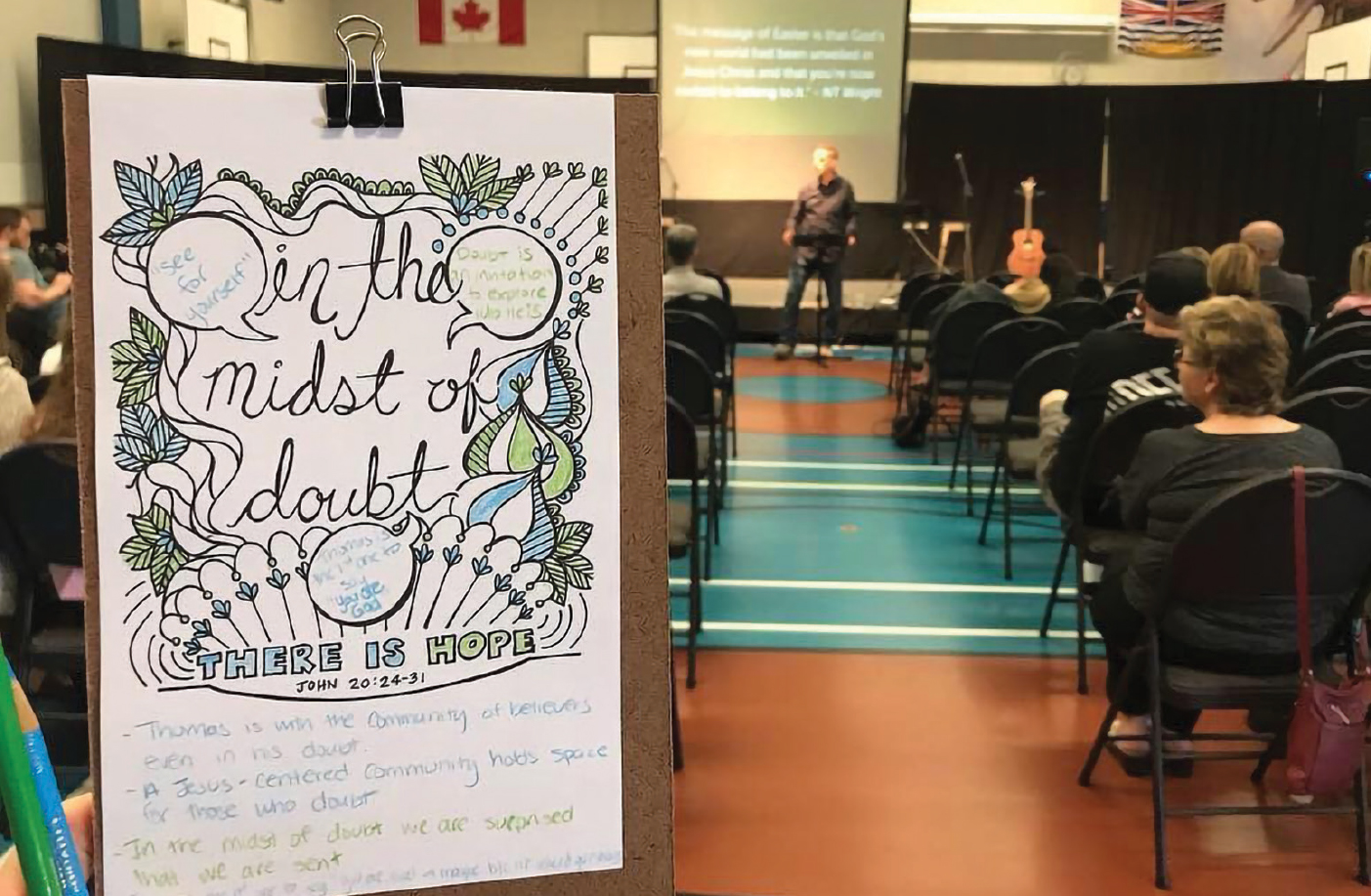Fewer musicians, lower sound levels – not recommendations you find in most church growth books. But for Coast Hills Community Church, Surrey, B.C., turning down the volume was just what the doctor ordered.
In spring 2019, the church was discerning what they were looking for in their next worship pastor. They formed a listening committee that attended every care group to gather feedback on worship.
What they learned surprised them: in their little congregation of 150, many experienced the volume of a regular church service as painful due to concussions, inner ear damage, or autism.
The church members began a conversation: “What can we do that’s different from what other bigger churches offer?” The result was Accessible Sunday.
Worth a thousand words
Worship director Julia McDougall recognized that many people
don’t learn best by sitting still and listening, and particularly
those with ADHD may need to fidget to maintain focus
throughout the service.
This inspired her to use the gifts of Coast
Hills artist Sidsel Richmond.
Snyder began sending Richmond his sermon outlines in
advance. Reflecting on each Sunday’s theme, Richmond creates
doodle sheets for children and adults alike to colour, make notes
on, and take home as a visual reminder of the message. Church
members Tony Ekkert and Gareth Brumburger repurposed
discarded wood into clipboards.
Not only are worshippers
engaged with the artwork, but for Richmond, these doodles have
become a new way to connect with God throughout the week;
she senses the Spirit as she draws.
Posture speaks volumes
Starting in March, on the first Sunday of each month, Coast Hills turns down the volume and sings to just one or two instruments.
“Think acoustic coffeehouse,” says worship director Julia McDougall. The sound team sought feedback from those with sensory sensitivities to find appropriate levels.
“The cool thing is that we’re hearing each other in the community,” says lead pastor Kevin Snyder. With the mics turned down, “we can hear each other sing, and we have to sit on the edge of our seats to hear the speaker.”
For members who don’t need reduced volume, Accessible Sunday is “a good lesson in ‘This isn’t just about me,’” says Snyder. “I can love my neighbour by coming to a church that might not have the loud songs I want, knowing that this person beside me is able to be here today because of that.’”
Coast Hills intentionally chose to hold Assessible Sundays on communion days: when they celebrate that they are all one.
Misfits in the kingdom
“We can talk about these things now,” says Snyder. Our weakness or disability is “not a black label; it’s who we are, so let’s talk about how to love each other best.”
“One of my children was diagnosed with autism last fall,” lay preacher and listening committee member Erin Julihn told Coast Hills in her Accessible Sunday sermon July 7, 2019. “My husband and I are having to reorient how we understand our child.”
“This is the love Paul is praying for in Philippians 1:9–11,” she said: a love “abounding in knowledge and depth of insight.”
“In all relationships, what we’re aiming to do is understand, ‘Who is that person, or who is that community, and how do I love them well?’”
Snyder himself was diagnosed with Tourette’s syndrome at 31. “Amazingly, by God’s grace, I don’t ever tic while I preach,” he says. But, he laughs, “When I’m not preaching, I’m the distraction.”
“Jesus calls misfits; that’s the kingdom of God.”
Music to their ears
Snyder reports that a local counsellor who heard about Accessible Sundays told Coast Hills kids life director Dani Boehm that she works with many families with autism who no longer feel comfortable in church. The counsellor then asked, “Can I send them to your church?”
“So Accessible Sunday might make children’s ministry look differently too,” says Snyder, “with more volunteers to offer one-on-one care for children.”
“We’re wondering what God is up to. Is Accessible Sunday something we need to do more often?” It’s a work in progress.
And the beautiful thing, says Snyder, is that the conversation continues to be “What is Spirit saying in community?”
Recently, Snyder heard one older woman, upon entering church, exclaim almost in tears, “It’s accessible Sunday: I don’t have to wear my earplugs!”
“What she was really saying,” says Snyder, “is ‘We have a voice here. We’re accepted.’”
According to an Angus Ried study released Jan. 22, 2019, one-quarter of Canadians identify as having a hearing, vision, or mobility disability. Some 28 percent of 35–54-year-olds say they anticipate mobility, vision, or hearing challenges arising in the next 5–10 years. This rises to 32 percent among those 55+.
Read more
How to support the parents of a child with hidden disabilities
